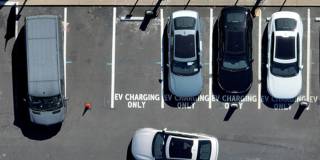Although electric vehicles have been promoted by presidents, governors, tax authorities, and tech wizards, sales trends indicate that the American public isn’t listening. Neither policy inducements nor price cuts have been sufficient to overcome the hurdles of physics, consumer inertia, and an unreliable electrical grid.
SAN DIEGO – In the early 1990s, every self-respecting American yuppie and retired suburban couple bought an electric bread maker, with sales hitting four million units. But the fad soon faded as these amateur bakers discovered that stuffing a precise quantity and ratio of flour, eggs, butter, yeast, and salt into a metal box takes time and costs much more than strolling to the corner bakery. Are plug-in electric vehicles (EVs) the bread makers of our day?
Despite Tesla founder Elon Musk’s entrepreneurial brilliance and billions of dollars in government subsidies to support EVs, it appears that consumers still prefer to drive to a gas station for a five-minute fill-up than to retrofit their garage and suffer the range anxiety that comes from hunting for a charging station in the parking lot of an abandoned shopping mall. J.D. Power reports that 21% of public chargers do not work in any case. As consumers start to shy away from EVs, their choice will affect not just the car industry, but US-China relations, state budgets, and commodity prices.
The evidence is rolling in fast. This month, Hertz, which purchased 100,000 Teslas to great fanfare in 2021, executed a squealing 180-degree turn and began dumping one-third of its EV fleet, taking a $245 million charge against its earnings. Its pledge to buy 175,000 EVs from GM will likely go up in smoke, too. Outside of wealthy, trendy communities, consumers are walking past plug-in EVs and snapping up hybrids and gasoline-powered engines instead.

SAN DIEGO – In the early 1990s, every self-respecting American yuppie and retired suburban couple bought an electric bread maker, with sales hitting four million units. But the fad soon faded as these amateur bakers discovered that stuffing a precise quantity and ratio of flour, eggs, butter, yeast, and salt into a metal box takes time and costs much more than strolling to the corner bakery. Are plug-in electric vehicles (EVs) the bread makers of our day?
Despite Tesla founder Elon Musk’s entrepreneurial brilliance and billions of dollars in government subsidies to support EVs, it appears that consumers still prefer to drive to a gas station for a five-minute fill-up than to retrofit their garage and suffer the range anxiety that comes from hunting for a charging station in the parking lot of an abandoned shopping mall. J.D. Power reports that 21% of public chargers do not work in any case. As consumers start to shy away from EVs, their choice will affect not just the car industry, but US-China relations, state budgets, and commodity prices.
The evidence is rolling in fast. This month, Hertz, which purchased 100,000 Teslas to great fanfare in 2021, executed a squealing 180-degree turn and began dumping one-third of its EV fleet, taking a $245 million charge against its earnings. Its pledge to buy 175,000 EVs from GM will likely go up in smoke, too. Outside of wealthy, trendy communities, consumers are walking past plug-in EVs and snapping up hybrids and gasoline-powered engines instead.